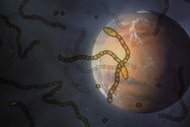Create a free profile to get unlimited access to exclusive videos, sweepstakes, and more!
Schrödinger's gas: Mars both has and does not have methane in its atmosphere

Does the atmosphere of Mars have methane in it or not?
This is a question that planetary scientists have been asking for years, and the answer, maddeningly is: Yes. No. Maybe. Well…
The question is actually pretty important. Methane is a simple molecule (a carbon atom with four hydrogens, if you’re keeping track), and can be made by lots of different processes. However, these boil down to two biggies: Methane is made either geologically or biologically. That is, it can be belched out by, say, volcanoes or vents, or it can be literally belched out by life. Think cows, bacteria, decaying plants. Martians bugs.
On Earth either or both of these methods wouldn’t be surprising. On Mars, either or both would be. The question of whether Mars is still geologically active is an interesting one; its surface is dotted with ancient, presumably extinct volcanoes, including Olympus Mons, the largest one in the entire solar system. Some volcanoes were active hundreds of millions of years ago, but today? It’s not clear.
As for life… well, the question there is pretty obvious. There’s no guarantee Mars has living things on or in it, and even if it did there’s no guarantee these wee beasties would eructate methane. But methane is made by life here on Earth, so it’s a good place to start thinking about it.
So the search for Martian methane is an important. We’d have to find some first, and then try to figure out where it came from.
The problem with that is that if it’s there, there ain’t much there. Some detections were made in 2003 using observations from Earth, but they were at the limits of what the telescopes here could do, so it was difficult to confirm. Those observations indicated there were plumes of gas, probably emitted in bursts, but again it was hard to tell.
Then in 2013 the Curiosity rover detected a spike in methane in Gale Crater, the huge impact crater it’s exploring. The next day, this spike was confirmed by the ESA’s Mars Express orbiter at the same site. This made it clear that Mars definitely has methane, even if only in tiny amounts; the spike seen was only 15 parts per billion of methane compared to the rest of the atmosphere.
Hurray!
But not so much!
Here to hold a match to this whole thing is the ESA’s Exomars Trace Gas Orbiter (or TGO), which has been observing Mars since 2016. It’s also equipped with instruments that can look for methane. And what it found was… nothing. No methane. And the observations were very sensitive; they would’ve seen levels of methane less than 1% of what Curiosity and Mars Express saw!
Arrrrrg. So does Mars have methane or not?
Key events in the detection and non-detection of methane in the atmosphere of Mars. Credit: ESA
There’s obviously some tension between these observations, but they don’t necessarily contradict each other. For example, TGO is sensitive to the atmosphere well above the surface, 5 or so kilometers up, while Curiosity is on the surface itself. Maybe the methane was lower down.
Or perhaps there’s a process that scrubs the methane from the atmosphere rapidly, enough so that it can be seen shortly after it’s released, but then it goes away — either breaking it down or sequestering it (storing it somehow). Theoretically, sunlight at Mars should break down methane in a few centuries, so this would have to be a new process. Chemistry on Mars is different than here on Earth; for example the surface has lots of perchlorates, a chemical that breaks down organic molecules rapidly. That may not be the culprit here; I’m just pointing out that the environment of Mars is different. Maybe there’s something acting on the methane we haven’t thought of yet.
Still, this is frustrating. Some scientists are still skeptical methane has been positively detected at all, and even if it has been the amount would have to be very low and go away rapidly. Either way, we’re missing something here.
I wish I had a better, more satisfying conclusion for you here, but hey, science. It’s not a goal, but a process. Perhaps something will come up soon, a new idea or a different/better detection. Or maybe this paradoxical Schrödinger’s methane will continue to simultaneously exist and not exist for some time to come.
We’ll get an answer… eventually. Until then, we keep our eyes on Mars, and try to figure out what it’s trying to tell us.



























